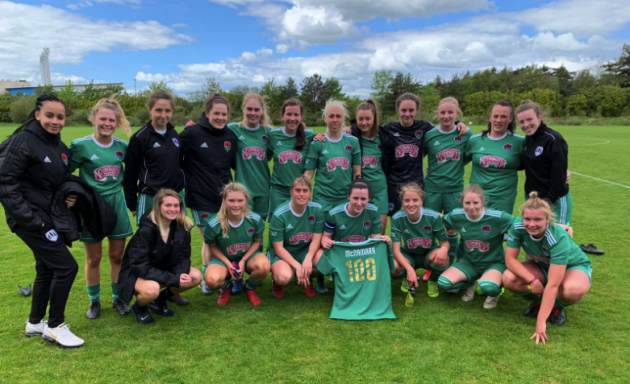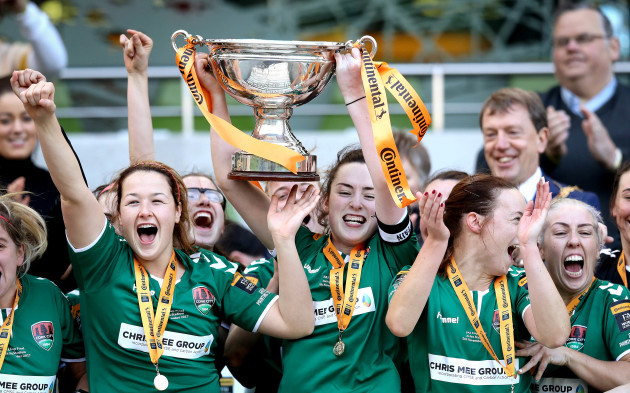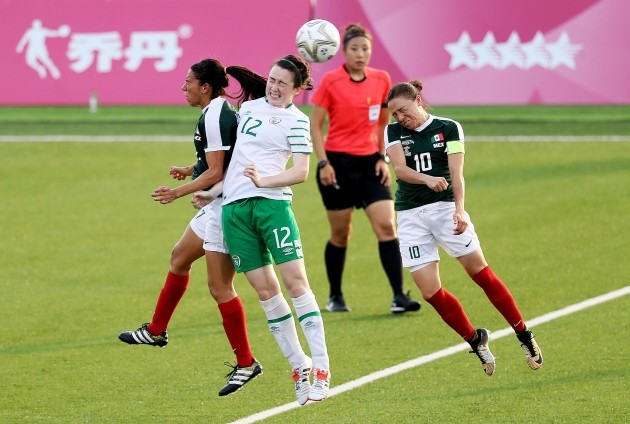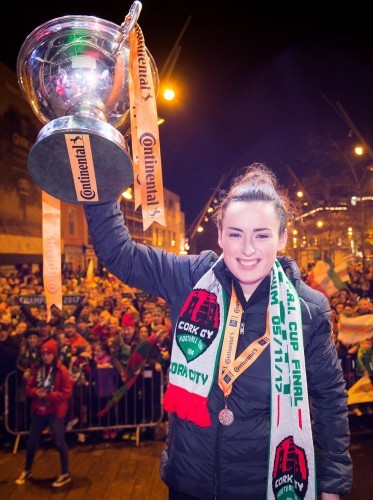SOME MIGHT DISMISS it as just another number, but Ciara McNamara appreciated the significance of the milestone.
Football has been prominent in her life for as long as she can remember. However, for the vast majority of her youth, playing for a club that represented her hometown at national level was a goal that didn’t exist.
To have done so 100 times by this relatively early stage in her career is something she therefore doesn’t take for granted. While the 3-0 defeat for Cork City was disappointing, last Sunday’s game against Peamount United was an occasion she can rightly reflect on with pride.
“It’s a pity we didn’t get the result but it’s an achievement I’m delighted with. I’m the fourth girl to do it, after Nathalie O’Brien, Katie McCarthy and Maggie Duncliffe — but they’d be a bit older than me, shall we say,” she laughs.
At 22, McNamara is already accustomed to being considered one of Cork City’s senior players. A conversation with the central defender quickly yields an understanding of why she was deemed worthy of the captain’s armband. Although every opinion is expressed with conviction, a natural humility prevents her from crossing the line that separates confidence from arrogance.
An Irish international at youth and universities level, McNamara skippered Cork City in 2017 when they defeated UCD Waves at the Aviva Stadium to win the FAI Women’s Cup for the first time. In spite of an inconsistent campaign so far this year, the Leesiders “are going in the right direction,” she says.
“I got the captaincy originally when I was only about 18 or 19,” explains the Whitechurch native, who was selected in the Women’s National League Team of the Year in 2017.
“The first time I was captain there were girls in the team who were 30, so the thought of having to give them instructions was daunting at the start. I suppose I’ve grown into it since then. It’s another chance to challenge yourself, which was how I saw it.”
Her role as captain places expectation on McNamara to lead the way at Cork City. Standing up to be counted is a task she’s been taking on since her very first day as a member of a football team.
She was five-years-old when her father brought her to St Mary’s AFC. The lack of a team which catered specifically for girls left her with little choice other than to get stuck in with the boys, which she did until the age of 13 when she joined a girls’ team at Wilton United.
“Playing on boys’ teams was the norm for me,” she recalls. “For matches I’d be put in a different dressing room, or I’d have to be ready when I got there.
“You’d be aware that people are looking at you a bit differently, thinking ‘what are you doing?’ You’d hear the other team going, ‘they’ve got a girl’. I was always well up for it going in for the first tackle. Then they’d be like, ‘ah ha, he got tackled by a girl’. You did have to fight your battles.
“In fairness to the lads I played with, it didn’t seem to be a big deal for them. They were accepting. I was still playing centre-half alongside the lads. It wasn’t like I was put out of the way. I suppose I didn’t over-think it. As far as I saw it, I was a member of the team, just like anyone else. That’s just the way things were.”
Thankfully, says McNamara, the landscape has now changed for young girls with a desire to play competitive football: “I think a really important thing now is that girls have female role models to look up to. When I was growing up, if you looked for a role model they were all male. There was no Denise O’Sullivan or anyone like that.
“I’d say probably 80% or 90% of the girls on our [Cork City] team have played on teams with boys at some stage. That’s just what you had to do if you wanted to play. But it’s good for girls coming up now that there are proper leagues and stuff like that. They have much better opportunities to aspire to, which shows the progress that has been made.”
McNamara would relish the opportunity to test herself at a club abroad in the future — “the realist in me says it’s unlikely to happen at this age” — and a first senior cap for Ireland is also among her ambitions.
It’s seldom that football isn’t at the forefront of her thoughts, but McNamara’s life isn’t consumed by the game. Her passion for helping young people who are enduring tough times is fuelled by a level of commitment akin to what she displays on the pitch.
Having obtained a degree in Social Science, McNamara is now a postgraduate student in Youth Work at University College Cork. She also contributes voluntarily to Jigsaw, a mental health support service which is geared specifically to people aged from 12 to 25.
“Mental health is being talked about a lot more these days, which is a good thing,” she says. “Previously — and this is something that always got to me — people would just say ‘their nerves are at them’ if someone was struggling.
“There’s a lot more to it than that. Someone might have experienced trauma, or they might just be going through a shit time for one reason or another. We’ve all been there and that’s perfectly normal.
“If you had a pain in your foot you’d go to a physio. If you had a pain in your stomach you’d go to a doctor. Why shouldn’t you look for help if you’re not feeling okay mentally? There shouldn’t be any taboo about it.
“I’ve always known that I wanted to do something that involved working with people. At the moment, I especially like the idea of youth work and working face-to-face with people. I really enjoy it.
“Obviously it’d be great to experience playing football in England or America, but I love being able to play for Cork City while getting my education at the same time. No matter what happened, I always wanted to have my education to fall back on. That’s the most important thing and that’s what I’m doing now.”
While football and education occupy separate areas of her life, McNamara’s impressive CV in the game has been a useful tool during her work placements.
“Sport can be a great platform to connect with young people,” she explains. “Someone might be a bit wary at first, but then you ask them if they watched the Champions League match last night and that brings them out. Talking about soccer helps to build up a relationship and you can take it from there.
“I think for everyone it’s important to have someone — no matter who it is — that you can open up to when needed. Nobody — absolutely nobody — is immune when it comes to mental health. Your mental health is like the weather: some days are good, others are bad.
“It’s very easy to fall into a bad place and there’s nothing wrong with you if that happens. I know there are a lot of people out there who have fallen so deep, so low, that they feel there’s no way out. Anyone can get overwhelmed. But there’s always help out there, which is why it’s so important that you do talk if you’re having a tough time.”
In a field where she ultimately intends to earn a living, McNamara is keen to make a difference for the sake of the young people she’s in a position to assist. There’s a similar objective when it comes to her role as a footballer.
She says: “For young girls who want to be involved in sport, it’s so important to keep fighting on their behalf if you can. We probably won’t reap the benefits of it, but the generations behind us will. Being treated equally has to become the norm, whether it’s for us or for the girls who come after us.
“With Cork City, things have improved since the women’s and the men’s teams merged. Even simple stuff like playing in Adidas gear, getting a gear bag, recognition on social media — it all matters. They’re small changes that have already happened, so I can only imagine what it’s going to be like in another couple of years.
“I’m coaching young girls in Hollyhill, and it’ll be interesting to see how far they can go in 10 years’ time. For a start, hopefully they’ll still be playing! But you’d imagine the possibilities for them will be much bigger than what they already are now. It’d be nice to look back and think that you inspired someone.
“It’s not even about getting to a high level in the game either. Just to inspire girls to keep going in sport would be great in itself. And if you’re the only girl? So what, fuck everyone else. If you want to play, don’t let anyone stop you.”
Subscribe to our new podcast, The42 Rugby Weekly, here:




